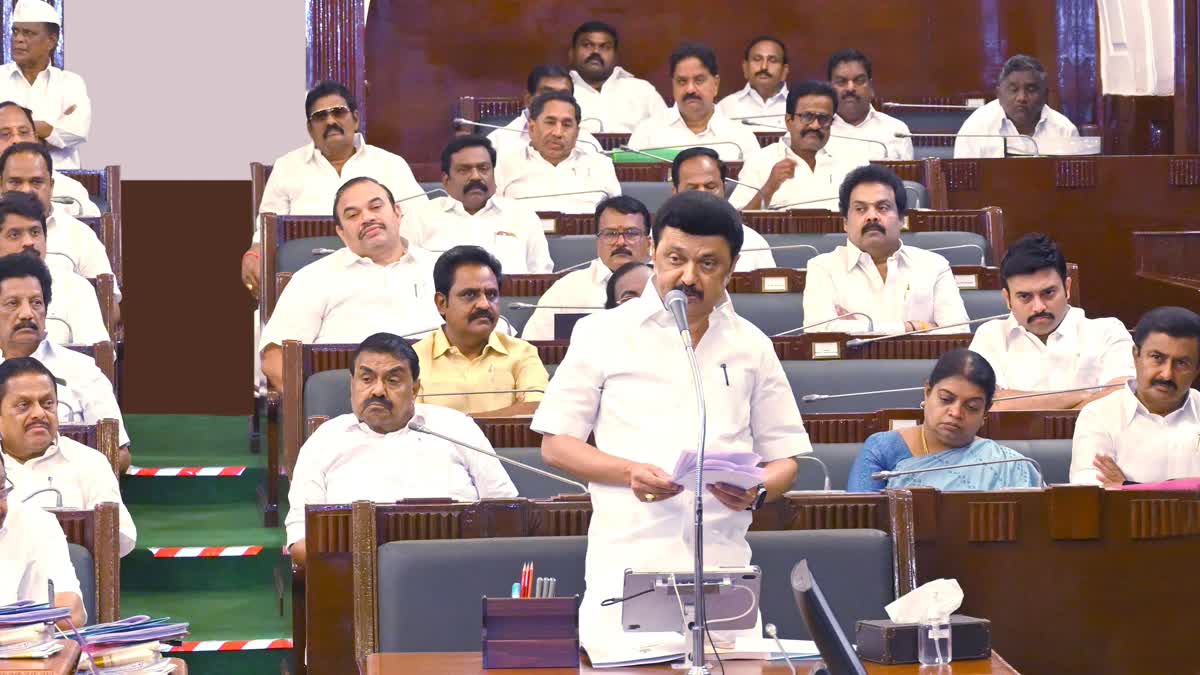Chennai: The Tamil Nadu Legislative Assembly on Saturday unanimously adopted a Bill amending 'The Tamil Nadu Prohibition Act, 1937', enhancing the punishment of rigorous imprisonment (RI) for life and a fine of up to Rs 10 lakh.
The amendment comes in the wake of the Kallakurichi hooch tragedy, which claimed 65 lives in the north Tamil Nadu district, with the latest death taking place on Friday.
The Bill was tabled by S Muthusamy, Minister for Housing and Urban Development, who also holds the charge of Excise and Prohibition. The amended act also empowers the Prohibition Officer or the Investigating Officer to banish an individual involved and convicted in the offences under the law to be removed from the said area, through the jurisdictional court.
Objects And Reasons
Muthusamy, in the statement of objects and reasons of the Bill, said "The Tamil Nadu Prohibition Act, 1937 (Tamil Nadu Act X of 1937) provides for various punishments for the offences such as import, export, transport, possession, manufacture, bottling and consumption of liquor, in violation of the provisions of the said Act and the rules made thereunder."
The Minister said the amendment is mooted as the punishments provided for in the existing laws were not sufficient. "It is considered that the punishments provided in the said Act for some of the heinous crimes, especially for the offences of manufacture, possession and selling of illicit liquor, which are injurious to the human life, are not sufficient to eliminate such crimes and to deter the offenders habitually indulging in such crimes," he said.
The Minister added that it was "expedient to completely eradicate the menace of illicit liquor from the state." He noted that the punishments for "the offences relating to prohibited liquors such as denatured spirits and methanol, which are often admixed with illicit liquor, have to be substantially increased." The Minister said the revision will have "a strong deterrent effect on the bootleggers who are habitually engaged in the manufacture, possession and sale of illicit liquors which often results in loss of precious human life."
Enhancement Of Punishment, Fine
The Tamil Nadu Prohibition (Amendment) Act, 2024, will come into force on such date as notified by the government. The amendment substantially enhances the term of imprisonment and quantum of fine for various offences under sections 4,5,6,7 and 11 of the Act.
As per the amendment, if the consumption of illicit liquor leads to death, then the punishment for bootleggers will be in RI for life with a fine not less than Rs 10 lakh. For other instances, the bootleggers can be awarded a maximum punishment of 10 years RI with a penalty of up to Rs 5 lakhs, as per the proposal.
Attachment Of Properties
The Government, he said, had decided to enhance the term of imprisonment and quantum of fine provided for commission of various offences under sections. He said the amendment had also proposed to confiscate all the movable properties used in the commission of such offences and also to seal the unlicensed places used for consumption of liquor.
Offences Will Be Non-Compoundable
The amendment moved by the government proposed that the offences committed under the act will be non-compoundable. When the offences are classified as non-compoundable, then the suspect will not be able to go for a compromise for any of the offences mentioned above. Therefore, the offender will have to face the law, as enacted.
Surety Bonds For Habitual Offenders
The amendment had revised the punishment for habitual offenders to get them to execute bonds of sureties as a deterrence. This provision has been inserted as section 52-AA. It will empower the Executive Magistrate to issue an order requiring those persons who are habitually committing the offences mentioned above to execute a bond with sureties for a substantial amount in order to deter such persons from committing such offences in future. The maximum duration of the security bond for the good behaviour of the habitual offender will be three years.
Banishment
The present amendment has also enabled the Prohibition Officer or the Investigating Officer to move an application seeking to banish an individual who had been convicted under the offences mentioned in the act. The said officer will move the jurisdictional court which would then pass orders based on the application and relocate the convicted individual from his place of residence to a different district or to a different locality as it deems fit.



